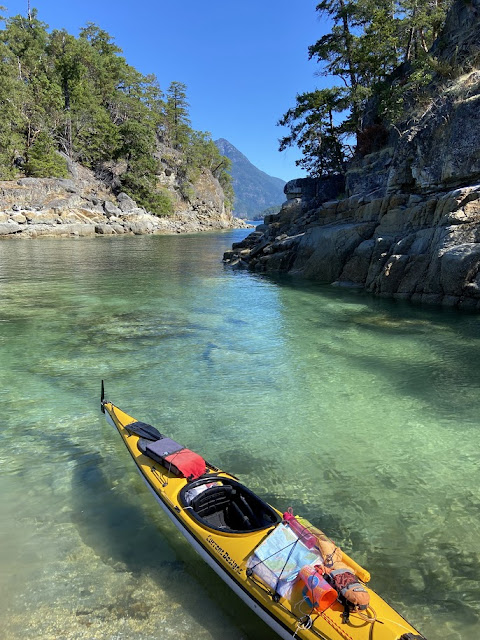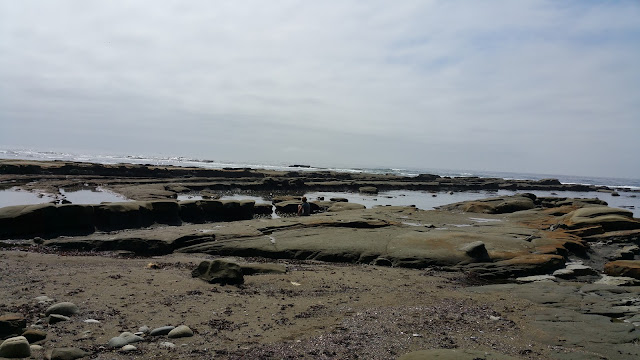 |
Multi-day trip in Desolation Sound |
A few years ago, I took a rappelling course from a local adventure company. The students were just me and one other person, a young guy. As we worked on our knots, the guide began a conversation about finding people you'd be comfortable climbing with, and also, being someone others would be comfortable climbing with. Then he asked the young man, whose name I've forgotten, but I'll call him Greg, to share a story about something that had happened to him recently. The story was that Greg had rented a kayak. Having never kayaked before in his life, he happily paddled out to the middle of Okanagan Lake. Like way out. Google tells me that Okanagan Lake is 120 kilometres long and between 3 and 5 kilometres wide. In other words, it's a big lake.
All was going well until the wind changed. Then Greg found himself tired out from his paddling so far and unable to make any headway. As he floundered, getting nowhere, he admitted that he grew petrified with fear at the size of the waves breaking over his kayak bow. Eventually, his energy completely spent, he pulled out his cell phone and called the kayak rental company to come and get him. A guide had to kayak out and tow him back in to shore.
My sister, who I've shared many adventures with, says it's important to know what you don't know. For example, Greg could have found out that the bigger the body of water, the greater the potential for big waves, because of something called fetch, the distance over which wind travels across the water. He could have also found out that the wind can change on Okanagan Lake, and setting out with it gently blowing in one direction is no guarantee that it won't change before you return.
Also, I personally would not kayak alone out into the middle of a lake unless I had to, for example to cross it. The nicest part of kayaking, IMHO, is staying close to shore where you can see things like birds and other shorelife and where bigger boats can't travel. Some kayakers love the big waves and will travel out into the lake for fun, but they tend to do it in groups for safety. Also, it's important to consider your stamina and to avoid using it all up on the first leg of your journey.
One thing I realized that day on the rappelling course as I heard the story is that I would not climb with a partner like Greg. Being adventurous is one thing. But being reckless is just a few skipped steps away.
Another day, my friend and I were setting out to kayak, again on Okanagan Lake. We unloaded our boats from our vehicles and then carried our gear down and began strapping it to the hull. We each carry an extra paddle, a throw rope, a pump (to pump water out of the boat) and a paddle float. In the photo above, I'm also carrying a marine chart and a plastic cup to use as a bailer, because I discovered through practice that my arms tire pretty quickly using the pump to empty my boat. But those are items I add only for a longer, multi-day trip.
While we were prepping our boats, a man stood by watching us. I noticed he had a slight grin on his face. When I met his eyes, he said, "You sure like to be prepared." His tone was gently mocking. I agreed that I did like to be prepared. He said "My friends I go out paddleboarding in the Atlantic Ocean with just a cell phone for safety gear." The implication was we were wimps and he and his friends were not. I smiled and refrained from comment, but I was thinking that it sounded like the perfect opening for an adventure-gone-wrong movie. In the movie, the fit, cocky man out on the ocean on his paddleboard loses sight of his friends when the weather changes. He tries to call someone on his cellphone, but discovers he can't see the numbers through the fog on the plastic. So he tries to fish it out of its holder and he drops it into the (very) cold Atlantic Ocean.
I don't want to leave my safety in someone else's hands. If I'm going on an adventure, I don't work Search and Rescue into my safety plan. That's a failed plan.
The paddleboarder's approach reminds me of something I've seen fairly often: a fear of looking stupid for being "over-prepared." Like people who don't wear helmets when riding or lifejackets when they're boating, some people seem to feel that taking steps to be prepared for things potentially going sideways is embarrassing. But which is really more embarrassing? To be the one who pulls out a mini air pump and a patch kit on a remote bike trail to help a stranger who gets a flat (as my spouse has done), or to be the one who makes someone else risk their own safety paddling out in high winds to tow them to shore?








